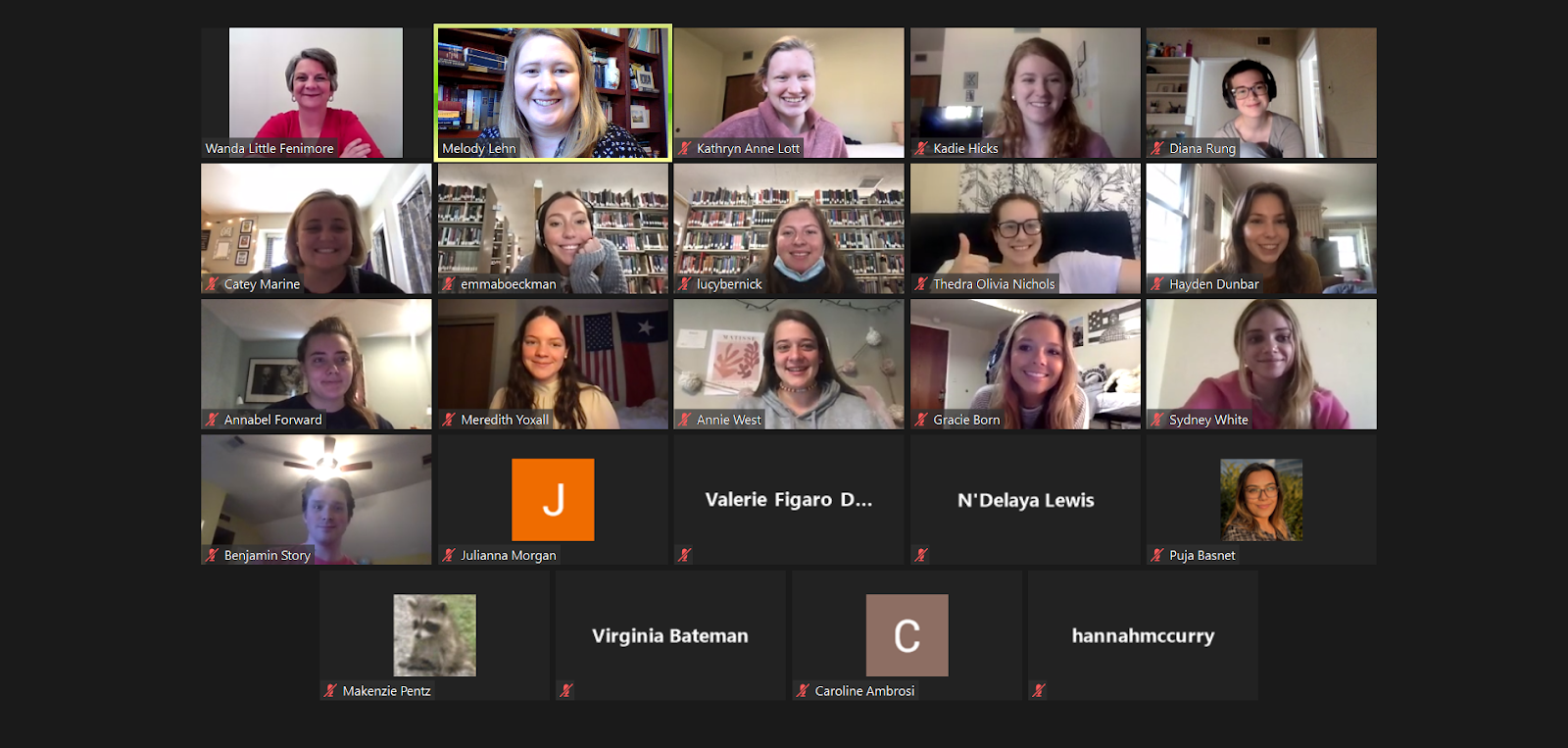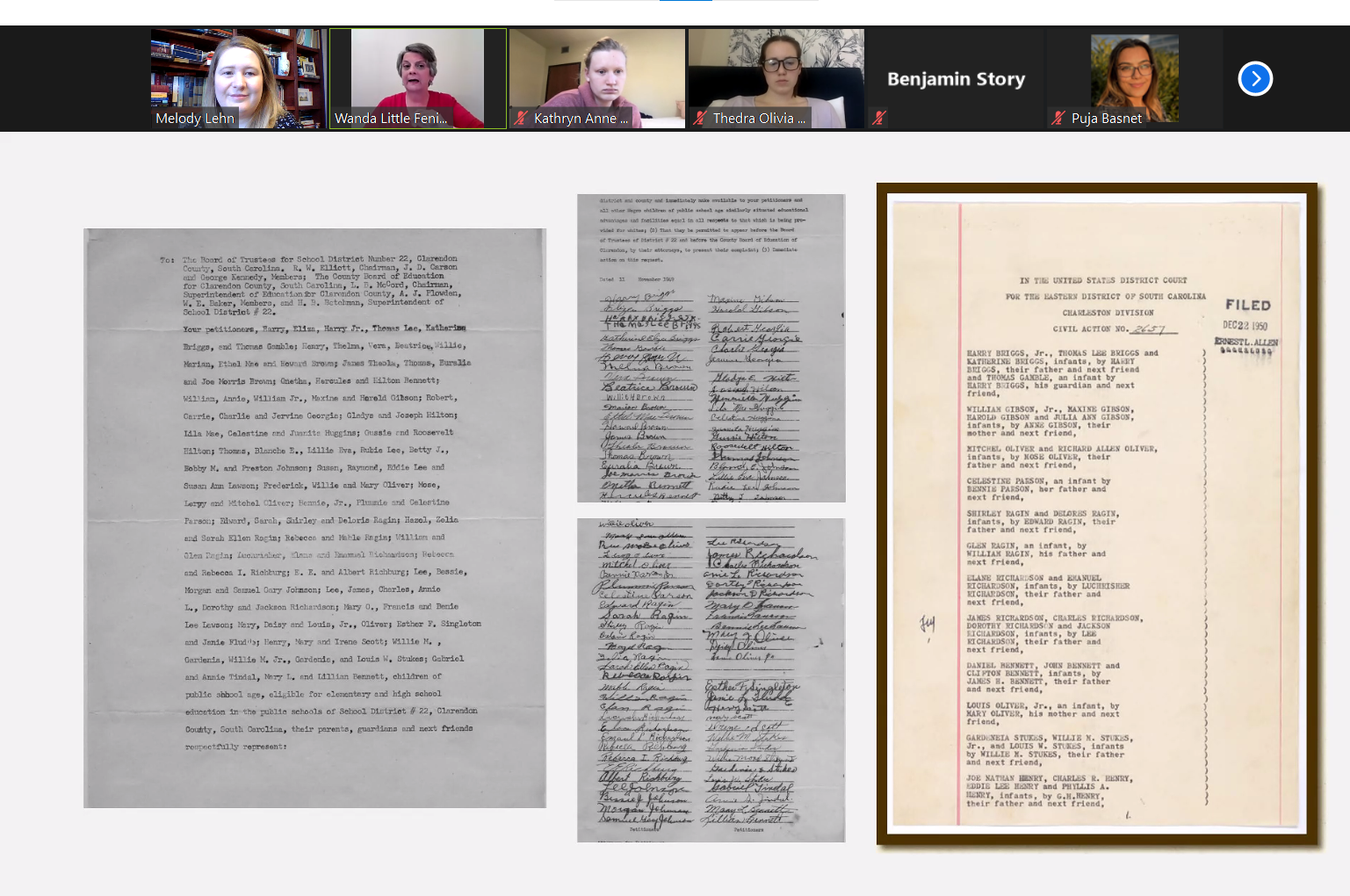
Aided by technology and supported by the Center for Teaching, my RHET 331: Voices of American Women class welcomed Dr. Wanda Little Fenimore, Assistant Professor of Speech Communication at the University of South Carolina-Sumter, to remotely join us on March 29, 2021. An award-winning teacher and scholar of rhetoric and public address, Dr. Fenimore holds a doctoral degree from Florida State University and previously taught at Hampden-Sydney College, where she also served as the Associate Director of the Ferguson Center for Public Speaking. Dr. Fenimore has recently completed a Mellon Faculty Fellowship through the American Council of Learned Societies to finish her upcoming book Elizabeth and Waties Waring: Paving the Rhetoric Road to Brown v. Board of Education. Students had the chance to read an advance copy of Dr. Fenimore’s forthcoming article on Elizabeth Waring in Rhetoric & Public Affairs to foreground a robust and engaging discussion of allyship, archival work, and research strategies.
The conversation began with an overview of the life and times of Elizabeth Waring, a largely forgotten yet rhetorically significant elite white woman who‒along with her husband, Judge J. Waties Waring‒publicly advocated on behalf of desegregation in the years leading up to the 1954 Brown v. Board of Education decision. Dr. Fenimore has spent the past several years locating and excavating Elizabeth Warings’ speeches. Many of these texts have been previously unavailable to scholars of women’s rhetoric in the Civil Rights Movement until now. As part of her time with us, Dr. Fenimore generously contextualized her research trajectory within a broader struggle to find complete and authentic texts amid “archival absences.” Such absences reflect how women orators, even those who are prominent in their own time, oftentimes end up lost to rhetorical history. In the case of Elizabeth Waring, her voice has been obscured because archives privilege the papers of her husband. Dr. Fenimore’s scholarship identifies, navigates, and rectifies the archival absence surrounding Elizabeth’s rhetorical contributions to anti-segregationist campaigns both in and beyond the South.

Elizabeth Waring’s anti-segregation rhetoric, Dr. Fenimore argues, presents us with a nuanced and timely look at the rhetorical strategies and missteps of white allyship. RHET 331 students engaged unpublished archival materials to unpack key differences between “provocative” and “problematic” white allyship. In the end, we found ourselves (as one student aptly put it) able to discuss “the complexity between analyzing historical rhetoric both as progressive for it’s time and still maintaining problematic aspects.”
By design, Dr. Fenimore also created a space for students to reflect upon their own challenges in researching lost, marginalized, misunderstood, and/or underrepresented women orators for their RHET 331 final research paper. The assignment requires students to select and analyze a speech by an American woman orator, deeply research the existing literature about speaker and text across disciplines, account for the historical context and rhetorical situation surrounding the text, and advance an original and supportable argument about the text. As one student noted, “I thought the presentation was very engaging and Dr. Fenimore gave some great interactive opportunities for us to consider our own research.” Another student appreciated the chance to collaboratively discuss “what rhetorical research best practices look like.”
We greatly appreciated the opportunity to connect with Dr. Fenimore, add to our analytical tool boxes as rhetorical critics, and deepen our understanding of the significance and responsibilities of white allyship through a historically-grounded case study with lessons for the current moment. Many thanks to the CFT for making this visit possible!

